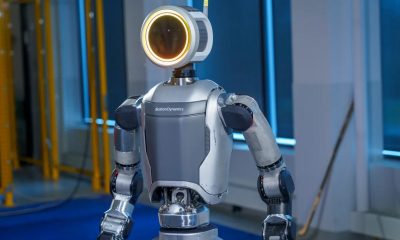Technology
Motherhood in the age of robots

Welcome to , an ongoing series at Mashable that looks at how to take care of – and deal with – the kids in your life. Because Dr. Spock is nice and all, but it’s 2018 and we have the entire internet to contend with.
During my first pregnancy, I craved a , believing it would alleviate by stress as a new mom. Unfortunately, a gadget with that kind of price tag just wasn’t in our budget. Instead, I did things the old-fashioned way, rocking my baby in my arms and using baby wraps for multitasking.
Nearly three years later, I’m thinking about it again as we wait on our second child. I knew that the mamaRoo – and my finances – had improved. The latest model has multiple motions, varying sounds, and mp3/Bluetooth compatibility. It’s pretty deluxe. As a work-from-home mom, it sounded perfect. But for some reason, its “moves like you do” description triggered me and planted a seed of doubt about my purpose as a mother. If it moves like I do, what does that mean for me?
Instead of keeping up with the Jones, we’re keeping up with the Jetsons.
What will it mean to be a mother in ten more years? A new wave of technology has arrived and continues to develop rapidly. With so many parent-like gadgets, I’m struggling to find my place in this quickly changing world.
Instead of keeping up with the Jones, we’re keeping up with the Jetsons. Our on their own. We have our children’s sleep patterns for us. There are even at a designated time. And all of this is accessible at a distance from our phones. These “parent tech” items are designed with slogans and goals related to making motherhood easy. But I cannot help but wonder if replacing the small daily tasks that promote bonding are impacting my usefulness.
I’ve heard so many discussions of the ways certain aspects of technology, like screen time, might affect children’s social development. However, I haven’t heard much talk about the ways technology is slowly but changing the way we parent. As a millennial mom, it’s hard to know if that evolution has been for better or worse – or how long it will be before AI does most of our parenting.
However, according to Executive Director of the , there are some aspects of development that AI just can’t provide. Social-emotional health is one such example – our children can’t appropriately develop without us.
“Children can’t learn to self-regulate until they experience co-regulation with a trusted adult. The fanciest rocker in the world can’t give a child the experience of co-regulation”, Kinder explains.
It’s possible a considerable amount of our tech obsession comes from doubt about how we’re doing as parents. Kinder believes that these doubts are a normal feature of parenthood.
“Every parent has found themselves in that moment where it feels like you have no idea how to be helpful to our child. Often your own narrative of fear and doubt causes you to be more agitated. All of that disrupts the connection your child needs”, she says.
Her words comforted me: Human-like would never replace human parents.
But how far might it go?
We know Americans’ are changing. Four out of ten Americans say they’d be interested in having a robot caregiver now. The majority, seven out of ten believe robot caregivers could help ease worry about the elderly.
I’ll be damned if I give these precious moments up to a robot.
In some parts of the world, this futuristic hypothetical is already a reality. Japan’s three-year-old “ ” produced by The Headquarters for Japan’s Economic Revitalization lists out the ways robots can take over a variety of tasks, including caregiving. By 2020, the strategy expects 80% of care recipients to have some form of assistance from robots.
As our nation gets more comfortable with the idea of robots caring for our parents, how long will it be until we allow them to care for our children? I think back to Rosie Robot from the Jetsons who fed, clothed, and held complex conversations with the family. I imagine a world where instead of being on the five-month waiting list for child care, I move freely about the town while my robot stays home tending to the children.
Consider how future robot caregivers might alleviate some of the childcare shortage. Perhaps, they could even ease the struggles for single-parent homes (if they can afford them). But will they ever make it there when so much of our resources are allocated to those in want as opposed to those in need?
Occasionally, there are bright spots. Recently, the National Perinatal Association (NPA) found that the mamaRoo rocker infant seat was (NAS) – a condition caused by opioid exposure in the womb – because of its unique human-like swaying motions.
When we were the parents of a NICU newborn connected to wires and fed by tubes, I would have sold my soul for the increased comfort that can come from having his vitals an app away. Babies with extenuating circumstances can get great benefits from the additional monitoring, data accumulation, and automated surveillance that our new age of parenting gadgets provide. I’m a firm believer those babies should have access to have the best resources available.
But even that won’t replace human parents. Can Rosie wipe the tears from my son’s eyes? Could a robot appreciate his joyful “moor-kneeing” greeting, or even understand it?
“Every interaction we have with our children breathes identity into them. They are layering something about themselves, adults, and something about the world each time”, says Kinder on the importance of children having healthy human caregivers. Robots and other parent tech don’t have the capacity to teach children about developing relationships or a sense of self. Each of these is vital to healthy development.
I’m not ready for Rosie to show up at my door yet, but that doesn’t mean I won’t use some of the benefits parent-tech has to offer. “If there anything that makes parenthood easier or smoother, great. I’m a huge believer in parents dipping into new resources to the degree they find it helpful then dropping into the trust they have in themselves,” concluded Kinder.
My family doesn’t have a current need for constant monitoring. Motherhood amnesia will take away unpleasant memories of night feeding soon enough. Even then, I’ll be damned if I give these precious moments up to a robot.
Read more great stories from Small Humans:
-

 Business7 days ago
Business7 days agoThis camera trades pictures for AI poetry
-

 Business6 days ago
Business6 days agoTikTok Shop expands its secondhand luxury fashion offering to the UK
-

 Business7 days ago
Business7 days agoBoston Dynamics unveils a new robot, controversy over MKBHD, and layoffs at Tesla
-

 Business5 days ago
Business5 days agoMood.camera is an iOS app that feels like using a retro analog camera
-

 Business5 days ago
Business5 days agoUnitedHealth says Change hackers stole health data on ‘substantial proportion of people in America’
-

 Business4 days ago
Business4 days agoTesla’s new growth plan is centered around mysterious cheaper models
-

 Entertainment5 days ago
Entertainment5 days agoFurious Watcher fans are blasting it as ‘greedy’ over paid subscription service
-

 Business4 days ago
Business4 days agoTwo widow founders launch DayNew, a social platform for people dealing with grief and trauma






















